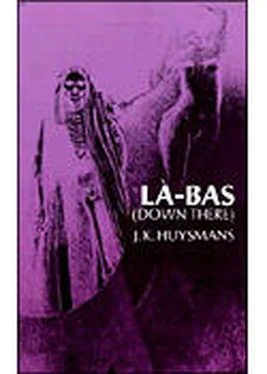Joris-Karl Huysmans - Down There (Là-Bas)
Здесь есть возможность читать онлайн «Joris-Karl Huysmans - Down There (Là-Bas)» весь текст электронной книги совершенно бесплатно (целиком полную версию без сокращений). В некоторых случаях можно слушать аудио, скачать через торрент в формате fb2 и присутствует краткое содержание. Жанр: Классическая проза, на английском языке. Описание произведения, (предисловие) а так же отзывы посетителей доступны на портале библиотеки ЛибКат.
- Название:Down There (Là-Bas)
- Автор:
- Жанр:
- Год:неизвестен
- ISBN:нет данных
- Рейтинг книги:3 / 5. Голосов: 1
-
Избранное:Добавить в избранное
- Отзывы:
-
Ваша оценка:
- 60
- 1
- 2
- 3
- 4
- 5
Down There (Là-Bas): краткое содержание, описание и аннотация
Предлагаем к чтению аннотацию, описание, краткое содержание или предисловие (зависит от того, что написал сам автор книги «Down There (Là-Bas)»). Если вы не нашли необходимую информацию о книге — напишите в комментариях, мы постараемся отыскать её.
Down There (Là-Bas) — читать онлайн бесплатно полную книгу (весь текст) целиком
Ниже представлен текст книги, разбитый по страницам. Система сохранения места последней прочитанной страницы, позволяет с удобством читать онлайн бесплатно книгу «Down There (Là-Bas)», без необходимости каждый раз заново искать на чём Вы остановились. Поставьте закладку, и сможете в любой момент перейти на страницу, на которой закончили чтение.
Интервал:
Закладка:
"That is probably why cats suddenly look upward and gaze curiously into space at something that is passing and that we can't see," said the bell-ringer's wife.
"No, thanks," said Gévingey to Des Hermies, who was offering him another helping of egg-and-dandelion salad.
"My friends," said the bell-ringer, "you forget only one doctrine, that of the Church, which attributes all these inexplicable phenomena to Satan. Catholicism has known them for a long time. It did not need to wait for the first manifestations of the spirits-which were produced, I believe, in 1847, in the United States, through the Fox family-before decreeing that spirit rapping came from the Devil. You will find in Saint Augustine the proof, for he had to send a priest to put an end to noises and overturning of objects and furniture, in the diocese of Hippo, analogous to those which Spiritism points out. At the time of Theodoric also, Saint Cæsaræus ridded a house of lemurs haunting it. You see, there are only the City of God and the City of the Devil. Now, since God is above these cheap manipulations, the occultists and spiritists satanize more or less, whether they wish to or not."
"Nevertheless, Spiritism has accomplished one important thing. It has violated the threshold of the unknown, broken the doors of the sanctuary. It has brought about in the extranatural a revolution similar to that which was effected in the terrestrial order in France in 1789. It has democratized evocation and opened a whole new vista. Only, it has lacked initiates to lead it, and, proceeding at random without science, it has agitated good and bad spirits together. In Spiritism you will find a jumble of everything. It is the hash of mystery, if I may be permitted the expression."
"The saddest thing about it," said Des Hermies, laughing, "is that at a séance one never sees a thing! I know that experiments have been successful, but those which I have witnessed-well, the experimenters seemed to take a long shot and miss."
"That is not surprising," said the astrologer, spreading some firm candied orange jelly on a piece of bread, "the first law to observe in magism and Spiritism is to send away the unbelievers, because very often their fluid is antagonistic to that of the clairvoyant or the medium."
"Then how can there be any assurance of the reality of the phenomena?" thought Durtal.
Carhaix rose. "I shall be back in ten minutes." He put on his greatcoat, and soon the sound of his steps was lost in the tower.
"True," murmured Durtal, consulting his watch. "It's a quarter to eight."
There was a moment of silence in the room. As all refused to have any more dessert, Mme. Carhaix took up the tablecloth and spread an oilcloth in its place.
The astrologer played with his rings, turning them about; Durtal was rolling a pellet of crumbled bread between his fingers; Des Hermies, leaning over to one side, pulled from his patch pocket his embossed Japanese pouch and made a cigarette.
Then when the bell-ringer's wife had bidden them good night and retired to her room, Des Hermies got the kettle and the coffee pot.
"Want any help?" Durtal proposed.
"You can get the little glasses and uncork the liqueur bottles, if you will."
As he opened the cupboard, Durtal swayed, dizzy from the strokes of the bells which shook the walls and filled the room with clamour.
"If there are spirits in this room, they must be getting knocked to pieces," he said, setting the liqueur glasses on the table.
"Bells drive phantoms and spectres away," Gévingey answered, doctorally, filling his pipe.
"Here," said Des Hermies, "will you pour hot water slowly into the filter? I've got to feed the stove. It's getting chilly here. My feet are freezing."
Carhaix returned, blowing out his lantern. "The bell was in good voice, this clear, dry night," and he took off his mountaineer cap and his overcoat.
"What do you think of him?" Des Hermies asked Durtal in a very low voice, and pointed at the astrologer, now lost in a cloud of pipe smoke.
"In repose he looks like an old owl, and when he speaks he makes me think of a melancholy and discursive schoolmaster."
"Only one," said Des Hermies to Carhaix, who was holding a lump of sugar over Des Hermies's coffee cup.
"I hear, monsieur, that you are occupied with a history of Gilles de Rais," said Gévingey to Durtal.
"Yes, for the time being I am up to my eyes in Satanism with that man."
"And," said Des Hermies, "we were just going to appeal to your extensive knowledge. You only can enlighten my friend on one of the most obscure questions of Diabolism."
"Which one?"
"That of incubacy and succubacy."
Gévingey did not answer at once. "That is a much graver question than Spiritism," he said at last, "and grave in a different way. But monsieur already knows something about it?"
"Only that opinions differ. Del Rio and Bodin, for instance, consider the incubi as masculine demons which couple with women and the succubi as demons who consummate the carnal act with men.
"According to their theories the incubi take the semen lost by men in dream and make use of it. So that two questions arise: first, can a child be born of such a union? The possibility of this kind of procreation has been upheld by the Church doctors, who affirm, even, that children of such commerce are heavier than others and can drain three nurses without taking on flesh. The second question is whether the demon who copulates with the mother or the man whose semen has been taken is the father of the child. To which Saint Thomas answers, with more or less subtle arguments, that the real father is not the incubus but the man."
"For Sinistrari d'Ameno," observed Durtal, "the incubi and succubi are not precisely demons, but animal spirits, intermediate between the demon and the angel, a sort of satyr or faun, such as were revered in the time of paganism, a sort of imp, such as were exorcised in the Middle Ages. Sinistrari adds that they do not need to pollute a sleeping man, since they possess genitals and are endowed with prolificacy."
"Well, there is nothing further," said Gévingey. "Görres, so learned, so precise, in his Mystik passes rapidly over this question, even neglects it, and the Church, you know, is completely silent, for the Church does not like to treat this subject and views askance the priest who does occupy himself with it."
"I beg your pardon," said Carhaix, always ready to defend the Church. "The Church has never hesitated to declare itself on this detestable subject. The existence of succubi and incubi is certified by Saint Augustine, Saint Thomas, Saint Bonaventure, Denys le Chartreux, Pope Innocent VIII, and how many others! The question is resolutely settled for every Catholic. It also figures in the lives of some of the saints, if I am not mistaken. Yes, in the legend of Saint Hippolyte, Jacques de Voragine tells how a priest, tempted by a naked succubus, cast his stole at its head and it suddenly became the corpse of some dead woman whom the Devil had animated to seduce him."
"Yes," said Gévingey, whose eyes twinkled. "The Church recognizes succubacy, I grant. But let me speak, and you will see that my observations are not uncalled for.
"You know very well, messieurs," addressing Des Hermies and Durtal, "what the books teach, but within a hundred years everything has changed, and if the facts I am are unknown to the many members of the clergy, and you will not find them cited in any book whatever.
"At present it is less frequently demons than bodies raised from the dead which fill the indispensable rôle of incubus and succubus. In other words, formerly the living being subject to succubacy was known to be possessed. Now that vampirism, by the evocation of the dead, is joined to demonism, the victim is worse than possessed. The Church did not know what to do. Either it must keep silent or reveal the possibility of the evocation of the dead, already forbidden by Moses, and this admission was dangerous, for it popularized the knowledge of acts that are easier to produce now than formerly, since without knowing it Spiritism has traced the way.
Читать дальшеИнтервал:
Закладка:
Похожие книги на «Down There (Là-Bas)»
Представляем Вашему вниманию похожие книги на «Down There (Là-Bas)» списком для выбора. Мы отобрали схожую по названию и смыслу литературу в надежде предоставить читателям больше вариантов отыскать новые, интересные, ещё непрочитанные произведения.
Обсуждение, отзывы о книге «Down There (Là-Bas)» и просто собственные мнения читателей. Оставьте ваши комментарии, напишите, что Вы думаете о произведении, его смысле или главных героях. Укажите что конкретно понравилось, а что нет, и почему Вы так считаете.












